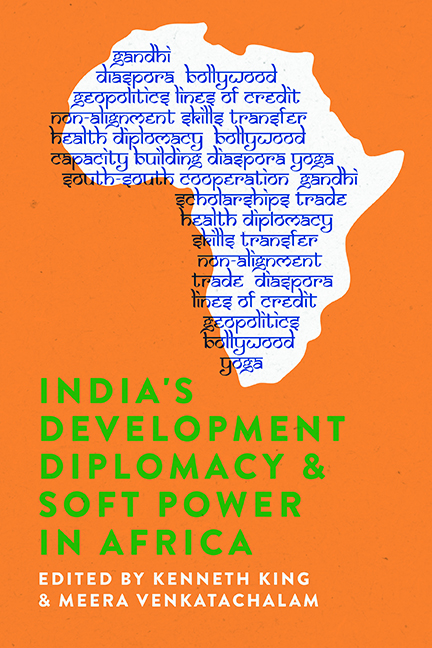Book contents
- Frontmatter
- Contents
- Notes on Contributors
- Acknowledgements
- List of Abbreviations
- Glossary
- Introduction: India–Africa Now: Changing Imaginaries and Knowledge Paradigms
- Part 1 The Geopolitical Imaginary and Soft Power
- Part 2 The Indian Political Right and the Reconfiguration of Soft Power in Africa
- Part 3 Capacity Building: Shifting Modalities and New Knowledgescapes
- Part 4 Skilling, Knowledge Transfer and Indo-African Interactions
- Conclusion: Reflections on India–Africa Studies, Development Cooperation and Soft Power
- Index
5 - India's Changing Human Resource Diplomacy with Africa, and Africa's Responses
Published online by Cambridge University Press: 26 May 2022
- Frontmatter
- Contents
- Notes on Contributors
- Acknowledgements
- List of Abbreviations
- Glossary
- Introduction: India–Africa Now: Changing Imaginaries and Knowledge Paradigms
- Part 1 The Geopolitical Imaginary and Soft Power
- Part 2 The Indian Political Right and the Reconfiguration of Soft Power in Africa
- Part 3 Capacity Building: Shifting Modalities and New Knowledgescapes
- Part 4 Skilling, Knowledge Transfer and Indo-African Interactions
- Conclusion: Reflections on India–Africa Studies, Development Cooperation and Soft Power
- Index
Summary
Introduction
Currently, India's engagements with Africa are much more visibly celebrated by India than by Africa. Or, rather, the Indian initiative behind the three India-Africa Forum Summits (IAFS) of 2008, 2011 and 2015 has produced a good deal of celebratory literature on the special relationship between India and Africa. Coffee table volumes have been associated with two of the IAFS events, and there have been several others (e.g. Arora and Chand 2015), but all deriving from the Indian side of the partnership (King 2019). There are, however, some African voices captured in these volumes, and none is more influential than Meles Zenawi, the former Prime Minister of Ethiopia, commenting on India supporting Africa while still dealing with large-scale poverty in India, and the former President of Malawi, Bingu Mutharika, a graduate of Indian higher education, attesting to the high quality of education available in India (King 2019; see McCann, this volume).
An illustration of this visibility of India–Africa, from the Indian side, is that, in 2019 alone, different Indian bodies organised no less than five high-level conferences on India–Africa. These include the Confederation of Indian Industry (CII) with EXIM Bank holding its fourteenth Conclave on India-Africa; the Indian Council of World Affairs (ICWA) reviewing India–Africa partnerships in a changing global order; the CII with the Ministry of Commerce and Industry (MCI) organising an India–Africa higher education and skill development summit; the CII-EXIM Bank holding a Regional Conclave on India and Southern Africa, and the Federation of Indian Chambers of Commerce and Industry (FICCI) with MCI arranging an India-East Africa Business Forum. Thus, India's private sector might appear more strategically interested in Africa than the Ministries of Education; commercial emphasis, however, was not present in a sixth high-level conference organised by the Indian International Centre (in February 2020) on ‘Understanding Africa: Continuity and change’. Its focus was explicitly on India–Africa interaction in the arts, history, culture and literature. Despite the pandemic in 2020, the ICWA organised a further India–Africa conference, online in November 2020, on contemporary realities and emerging prospects.
However, on the many different dimensions of capacity building and human resource development (HRD) provided to Africa by India, this chapter offers some commentary by several African beneficiaries.
- Type
- Chapter
- Information
- India's Development Diplomacy and Soft Power in Africa , pp. 101 - 120Publisher: Boydell & BrewerPrint publication year: 2021



